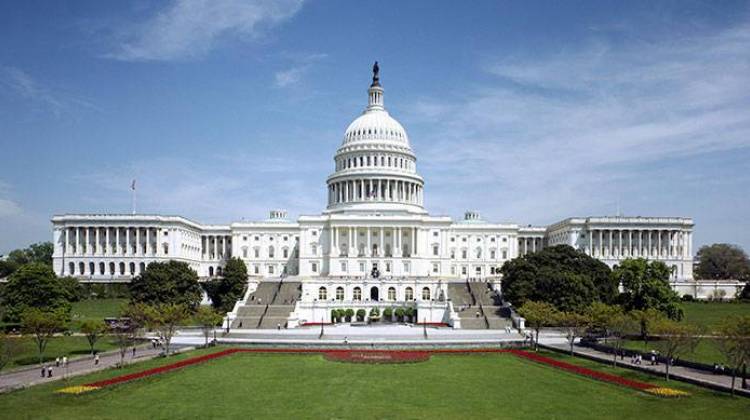WASHINGTON – Indiana’s two U.S. senators voted Wednesday night for a deal to end the 16-day government shutdown and raise the nation’s borrowing limit but the state’s House delegation split its votes.
Congressional leaders came up with the stop-gap measure that would reopen the government through Jan. 15 and raise the debt ceiling through Feb. 7. It would also force both the House and Senate to appoint negotiators to discuss the budget by Dec. 13.
U.S. Sens. Dan Coats, a Republican, and Joe Donnelly, a Democrat, voted for the deal. So did U.S. Reps. Pete Visclosky, D-1st District; District; Susan Brooks, R-5th District; Andre Carson, D-7th District; and Todd Young, R-9th District.
But U.S. Reps. Jackie Walorski, R-2nd District; Marlin Stutzman, R-3rd District; Todd Rokita, R-4th; Luke Messer, R-6th District; and Larry Bucshon, R-8th District, voted no.
“I wanted to make sure to push the debt ceiling out as far as we could, and obviously, I would have liked it out farther,” Donnelly said in a conference call. He was one of 14 senators who helped put the deal together.
“I don’t think it will be like this again next time,” Donnelly said. “I can tell you that from everyone that I’ve talked to there is no appetite for a repeat of this in the Senate. I am hopeful that the House will feel the same way.”
The Senate bill had support from Republican House Speaker John Boehner but he needed Democrats to pass the legislation to President Barack Obama. It passed the House 285-144, with all Democrats voting yes and a majority of GOP members voting no.
“We fought a hard fought fight, but we’re coming up on the debt ceiling tonight,” Bucshon said. “The House Republicans will continue to fight for changes in Obamacare. We’re going to continue to fight to get our spending under control and get this government on a more fiscally sustainable pathway.”
But Republicans failed to get any of their initial Obamacare demands during the shutdown – the proposal doesn’t touch the medical device tax, it didn’t delay the individual mandate, nor defund the law.
The deal would require income verification for those seeking subsidies for their health insurance under the health care law. And it also retroactively pays furloughed federal workers.
Donnelly said he’s disappointed the deal doesn’t repeal the medical device tax but he said he’s hopeful the issue will be addressed in talks soon.
Young also said the repeal of the medical device tax is one place where lawmakers can look for common ground as they work toward the next budget deal.
“We must commit ourselves to avoiding the constant cycle of brinksmanship by working across party lines to address issues like job creation, stagnant personal incomes, our unsustainable national debt, and rising healthcare costs — and we must do that as soon as the current stalemate is resolved, not when we’re facing the next deadline,” Young said in a statement.
But Bucshon said he voted no in part because the Senate proposal didn’t repeal the medical device tax. And he said it raised the debt ceiling without any spending cut provisions.
“That doesn’t mean though it won’t pass,” he said. “But at the end of the day, I can’t support it for those reasons.”
Messer agreed.
“The bill does little to protect the American people from Obamacare or to protect our children and grandchildren from inheriting a mountain of debt,” he said in a statement Wednesday. Despite saying he refuses to vote for the Senate proposal, he said in the statement he’s “glad to see the shutdown ending,” referring to the likely votes the House has in Democrats and some Republicans.
“It’s time to get people back to work and time for Congress to move forward,” he said.
But Bucshon sees the measure as “kicking the can down the road,” and delaying the issues for a repeat of this fight early next year.
“I think the situation won’t be much difference once those dates come around,” he said.
In retrospect, he said, the media attention surrounding the shutdown and debt ceiling drama has overshadowed the problems Obamacare has had in rolling out the law.
“This is not just computer glitches, this is serous underlying problems with the structure of the health care law,” he said. “When people start to find out how much the deductibles are … and what the overall cost is of these health care plans, I think you’re going to see more attention put on it.”
Reach reporter Jessica Wray at jessica.wray@shns.com or 202-326-9865. SHFWire stories are free to any news organization that gives the reporter a byline and credits the SHFWire.
 DONATE
DONATE




 View More Programs
View More Programs

 Support WFYI. We can't do it without you.
Support WFYI. We can't do it without you.